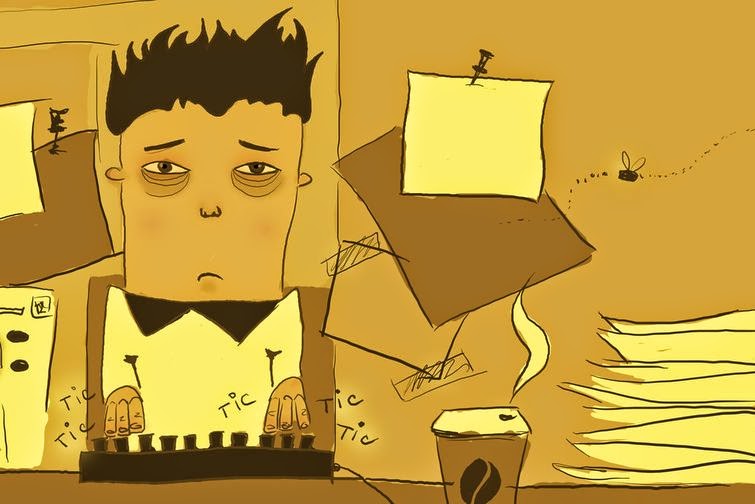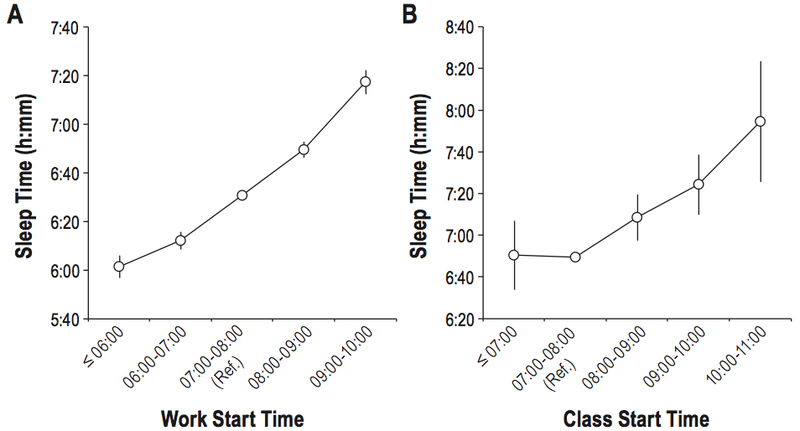Why the workday should be 10–6, not 9–5

Notes from Dr. Norman Blumenstock
Updated by Susannah Locke on December 17, 2014, 9:10 a.m. ET
 |
| A later start of work or classes was correlated with more sleep overall. (Basner, M. et al. SLEEP Vol. 37, No. 12, 2014) |
The study used data from the American Time Use Survey that the US Bureau of Labor Statistics does each year. Overall, they examined the habits of 124,517 people.
We don’t know yet if the timing of the workday actuallycauses more sleep
There are several key caveats for this study, many of which were pointed out by either the authors themselves or by Lauren Hale, a public-health expert at SUNY Stony Brook, in an accompanying editorial published in the same issue of the journal.
For one, this dataset can only show correlations. It cannot determine that any factor really causes more or less sleep, or vice versa. As Hale notes: “It could also be that those who are short sleepers intentionally select jobs with earlier schedules (or those who prioritize long sleep do not consider jobs with earlier, more rigid schedules).”
She also writes that it’s unclear if having people cut back on, say, paid work or commuting time would actually translate to more sleep: “Perhaps an extra hour in one’s day will lead to more time eating potato chips on the couch rather than sleeping more?”
The only way to figure that out, though, is to go ahead and do an experiment and get people — and/or their bosses — to try it out.

There’s actually another benefit to starting the workday later. Helping people get more sleep is the obvious one. But the other is that it would keep sleep schedules more consistent throughout the week, decreasing what researchers call “social jetlag.”
There’s increasing evidence that when people are sleeping can be as important as how muchthey’re sleeping. Even if you get your recommended eight hours a night, you can still feel terrible if you are going to sleep and waking up at different times over the course of the week. And that’s what most people are doing — essentially putting their brains through jetlag. It’s one reason why so many people end up feeling terrible on Monday mornings.
SOCIAL JETLAG HAS BEEN LINKED TO OBESITY
Over the past few years, some research has been indicating that even a modest variation in waking and sleeping times can create serious health issues. For example, in 2012, German research Till Roenneberg co-authored a study that found that even the normal social jetlag that occurs between weekdays and weekends was correlated with increased body-mass index for overweight people. A lag of just one hour increases the likelihood of obesity by about a third.
So what can be done about it? There are really only two ways to fix social jetlag: either get up early on the weekends (ick) or sleep in later on workdays (hooray, hooray).
Not everyone can just show up late for work every day. Here’s how to get more sleep, anyway:
The new SLEEP study noted several correlations that might be a little easier to get a handle on. It linked shorter sleep to watching more TV at night and spending more time grooming in the morning. So maybe there’s something you can cut down on there. Like high maintenance hair.
There are also things you can do that didn’t happen to be covered in the study. These include limiting caffeine in the afternoon, seeking out bright light in the morning and avoiding it before bed (including from glowing screens), and keeping regular wake and bedtimes through the week — even on weekends.




